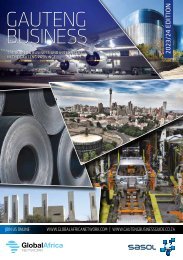South African Business 2019 edition
The 2019 edition of South African Business is the seventh edition of this annual guide to business and investment in South Africa. Regular pages cover all the main economic sectors of the South African economy and give a snapshot of each of the country’s provincial economies. Feature articles on topical issues such as Special Economic Zones and African trade provide unique insights, together with comprehensive overviews of critical economic sectors. Other special features focus on the exciting new possibilities in renewable energy, airports as engines of regional growth and the maritime sector as an entirely new prospect for South African entrepreneurs and businesses. South African Business is complemented by nine regional publications covering the business and investment environment in each of South Africa’s provinces. The e-book editions can be viewed at www.globalafricanetwork.com
The 2019 edition of South African Business is the seventh edition of this annual guide to business and investment in South Africa.
Regular pages cover all the main economic sectors of the South African economy and give a snapshot of each of the country’s provincial economies. Feature articles on topical issues such as Special Economic Zones and African trade provide unique insights, together with comprehensive overviews of critical economic sectors. Other special features focus on the exciting new possibilities in renewable energy, airports as engines of regional growth and the maritime sector as an entirely new prospect for South African entrepreneurs and businesses.
South African Business is complemented by nine regional publications covering the business and investment environment in each of South Africa’s provinces. The e-book editions can be viewed at www.globalafricanetwork.com
You also want an ePaper? Increase the reach of your titles
YUMPU automatically turns print PDFs into web optimized ePapers that Google loves.
INTERVIEW<br />
get them to understand how renewable energy<br />
could play a role in achieving government’s economic<br />
and development objectives, ranging from<br />
power supply at a much more affordable rate<br />
right through to building new skills and catapulting<br />
<strong>South</strong> Africa into a new era. We started with<br />
that in 2001, way before the REIPPPP was even<br />
dreamt of. We had the vision, we had the tenacity<br />
and the wherewithal to stick it through – and<br />
that still holds today. It’s in our pioneering DNA.<br />
Together with others, we have been able to convince<br />
policy-makers that renewable energy has<br />
a fundamental role to play in reshaping the way<br />
that we deliver and use energy.<br />
I presume that you are pleased that there<br />
is an Integrated Resource Plan (IRP) and<br />
that RE is part of it?<br />
Yes, we are pleased. Renewable energy is starting<br />
to take its rightful place. The IRP in itself still needs<br />
to go a long way to reflect adequately the realities<br />
of the 4th Industrial Revolution. We think this will<br />
happen as <strong>South</strong> Africa comes to terms with all the<br />
demands for jobs and for economic growth. The<br />
economic challenges that we have today need to<br />
be reflected in the IRP. Renewables are uniquely<br />
positioned to drive economic growth.<br />
the needs of a local municipality and industries who<br />
were struggling with power quality. The project was<br />
born with the objective of strengthening the grid,<br />
strengthening power quality and playing a major role<br />
in economic development in the Jeffreys Bay area.<br />
We exited the project when we sold it on at financial<br />
close in Round One of the REIPPPP.<br />
Where else are you active now?<br />
We also secured two 50MW PV plants in Round One.<br />
In Round Three we were successful with three wind<br />
farms, all three of which are now operational and in<br />
which we still retain a 15% shareholding. The wind<br />
farms in the Northern Cape are Khobab, Loeriesfontein<br />
and Noupoort. We are actively developing projects in<br />
three <strong>South</strong>ern <strong>African</strong> countries.<br />
Did retaining your share represent a shift in<br />
thinking?<br />
Genesis is a <strong>South</strong> <strong>African</strong> born and bred company.<br />
We aim to hold on to our projects for the long term<br />
if we can. We have a long-term vision of owning<br />
and operating a significant portfolio of projects.<br />
Genesis is one of the few 100% <strong>South</strong> <strong>African</strong>-owned<br />
development companies that have been around for<br />
some time. We believe that <strong>South</strong> Africa has wonderful<br />
natural assets and they are under-utilised. The<br />
country’s natural resources and its human resources<br />
are under-utilised, and we’re finding innovative ways<br />
to harness both to the benefit our country and its<br />
people.<br />
Are you interested in technologies besides<br />
wind and solar?<br />
We talk about hydro-marine and bio-energy because<br />
we also have a very strong interest in the<br />
full spectrum of renewables. It is still early days for<br />
marine energy though it holds promise.<br />
What underpinned the decision to develop<br />
Jeffreys Bay and when did you exit the<br />
project?<br />
The team identified an opportunity for wind technology<br />
to play a role at local scale and deliver on<br />
31 SOUTH AFRICAN BUSINESS <strong>2019</strong>


















